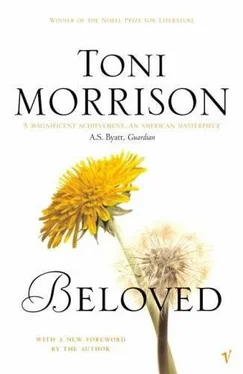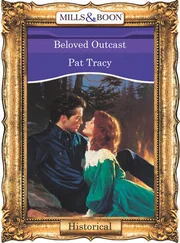She needed to get up from there, go downstairs and piece it all back together. This house he told her to leave as though a house was a little thing-a shirtwaist or a sewing basket you could walk off from or give away any old time. She who had never had one but this one; she who left a dirt floor to come to this one; she who had to bring a fistful of salsify into Mrs. Garner's kitchen every day just to be able to work in it, feel like some part of it was hers, because she wanted to love the work she did, to take the ugly out of it, and the only way she could feel at home on Sweet Home was if she picked some pretty growing thing and took it with her. The day she forgot was the day butter wouldn't come or the brine in the barrel blistered her arms.
At least it seemed so. A few yellow flowers on the table, some myrtle tied around the handle of the flatiron holding the door open for a breeze calmed her, and when Mrs. Garner and she sat down to sort bristle, or make ink, she felt fine. Fine. Not scared of the men beyond. The five who slept in quarters near her, but never came in the night. Just touched their raggedy hats when they saw her and stared. And if she brought food to them in the fields, bacon and bread wrapped in a piece of clean sheeting, they never took it from her hands. They stood back and waited for her to put it on the ground (at the foot of a tree) and leave. Either they did not want to take anything from her, or did not want her to see them eat. Twice or three times she lingered. Hidden behind honeysuckle she watched them. How different they were without her, how they laughed and played and urinated and sang. All but Sixo, who laughed once-at the very end. Halle, of course, was the nicest. Baby Suggs' eighth and last child, who rented himself out all over the county to buy her away from there. But he too, as it turned out, was nothing but a man.
"A man ain't nothing but a man," said Baby Suggs. "But a son?
Well now, that's somebody."
It made sense for a lot of reasons because in all of Baby's life, as well as Sethe's own, men and women were moved around like checkers.
Anybody Baby Suggs knew, let alone loved, who hadn't run off or been hanged, got rented out, loaned out, bought up, brought back, stored up, mortgaged, won, stolen or seized. So Baby's eight children had six fathers. What she called the nastiness of life was the shock she received upon learning that nobody stopped playing checkers just because the pieces included her children. Halle she was able to keep the longest. Twenty years. A lifetime. Given to her, no doubt, to make up for hearing that her two girls, neither of whom had their adult teeth, were sold and gone and she had not been able to wave goodbye. To make up for coupling with a straw boss for four months in exchange for keeping her third child, a boy, with her-only to have him traded for lumber in the spring of the next year and to find herself pregnant by the man who promised not to and did. That child she could not love and the rest she would not. "God take what He would," she said. And He did, and He did, and He did and then gave her Halle who gave her freedom when it didn't mean a thing.
Sethe had the amazing luck of six whole years of marriage to that "somebody" son who had fathered every one of her children.
A blessing she was reckless enough to take for granted, lean on, as though Sweet Home really was one. As though a handful of myrtle stuck in the handle of a pressing iron propped against the door in a whitewoman's kitchen could make it hers. As though mint sprig in the mouth changed the breath as well as its odor. A bigger fool never lived.
Sethe started to turn over on her stomach but changed her mind.
She did not want to call Paul D's attention back to her, so she settled for crossing her ankles.
But Paul D noticed the movement as well as the change in her breathing. He felt obliged to try again, slower this time, but the appetite was gone. Actually it was a good feeling-not wanting her.
Twenty-five years and blip! The kind of thing Sixo would do-like the time he arranged a meeting with Patsy the Thirty-Mile Woman.
It took three months and two thirty-four-mile round trips to do it.
To persuade her to walk one-third of the way toward him, to a place he knew. A deserted stone structure that Redmen used way back when they thought the land was theirs. Sixo discovered it on one of his night creeps, and asked its permission to enter. Inside, having felt what it felt like, he asked the Redmen's Presence if he could bring his woman there. It said yes and Sixo painstakingly instructed her how to get there, exactly when to start out, how his welcoming or warning whistles would sound. Since neither could go anywhere on business of their own, and since the Thirty-Mile Woman was already fourteen and scheduled for somebody's arms, the danger was real.
When he arrived, she had not. He whistled and got no answer. He went into the Redmen's deserted lodge. She was not there. He returned to the meeting spot. She was not there. He waited longer. She still did not come. He grew frightened for her and walked down the road in the direction she should be coming from. Three or four miles, and he stopped. It was hopeless to go on that way, so he stood in the wind and asked for help. Listening close for some sign, he heard a whimper. He turned toward it, waited and heard it again. Uncautious now, he hollered her name. She answered in a voice that sounded like life to him-not death. "Not move!" he shouted. "Breathe hard I can find you." He did. She believed she was already at the meeting place and was crying because she thought he had not kept his promise.
Now it was too late for the rendezvous to happen at the Redmen's house, so they dropped where they were. Later he punctured her calf to simulate snakebite so she could use it in some way as an excuse for not being on time to shake worms from tobacco leaves. He gave her detailed directions about following the stream as a shortcut back, and saw her off. When he got to the road it was very light and he had his clothes in his hands. Suddenly from around a bend a wagon trundled toward him. Its driver, wide-eyed, raised a whip while the woman seated beside him covered her face. But Sixo had already melted into the woods before the lash could unfurl itself on his indigo behind.
He told the story to Paul F, Halle, Paul A and Paul D in the peculiar way that made them cry-laugh. Sixo went among trees at night. For dancing, he said, to keep his bloodlines open, he said.
Privately, alone, he did it. None of the rest of them had seen him at it, but they could imagine it, and the picture they pictured made them eager to laugh at him-in daylight, that is, when it was safe.
But that was before he stopped speaking English because there was no future in it. Because of the Thirty-Mile Woman Sixo was the only one not paralyzed by yearning for Sethe. Nothing could be as good as the sex with her Paul D had been imagining off and on for twenty-five years. His foolishness made him smile and think fondly of himself as he turned over on his side, facing her. Sethe's eyes were closed, her hair a mess. Looked at this way, minus the polished eyes, her face was not so attractive. So it must have been her eyes that kept him both guarded and stirred up. Without them her face was manageable-a face he could handle. Maybe if she would keep them closed like that… But no, there was her mouth. Nice. Halle never knew what he had.
Although her eyes were closed, Sethe knew his gaze was on her face, and a paper picture of just how bad she must look raised itself up before her mind's eye. Still, there was no mockery coming from his gaze. Soft. It felt soft in a waiting kind of way. He was not judging her-or rather he was judging but not comparing her. Not since Halle had a man looked at her that way: not loving or passionate, but interested, as though he were examining an ear of corn for quality.
Читать дальше











